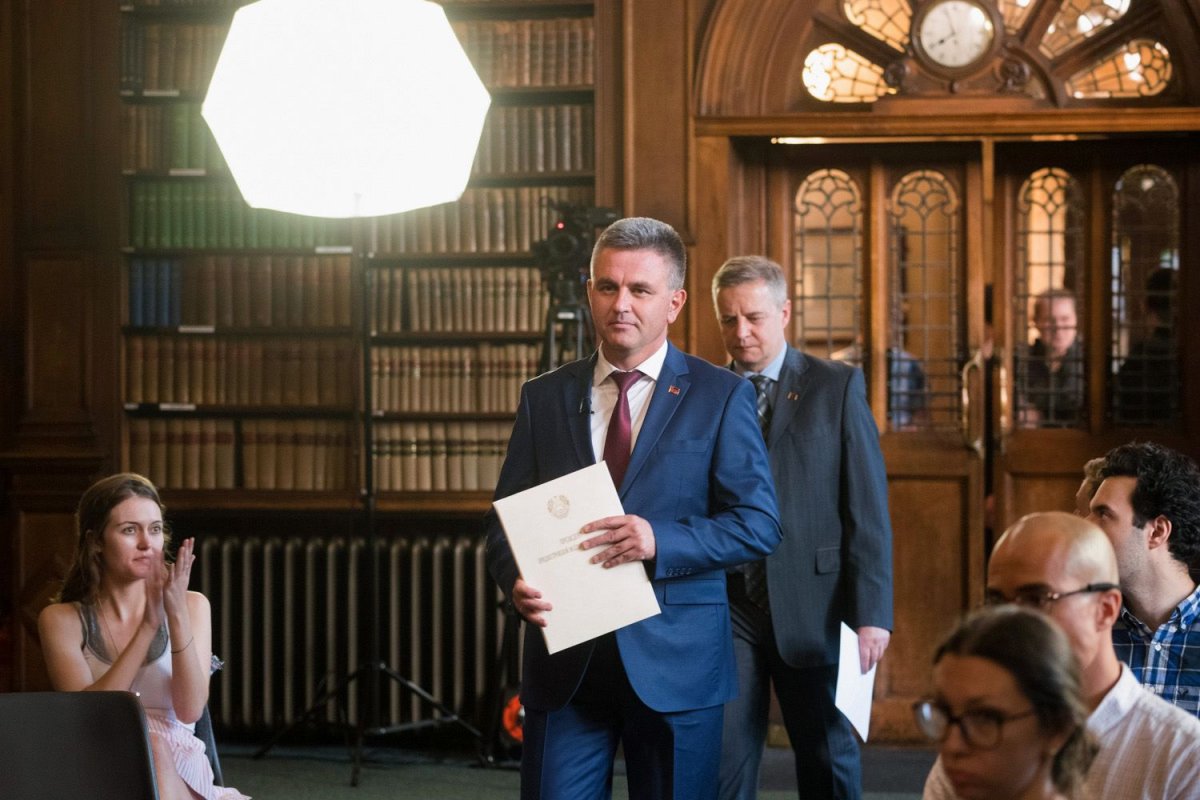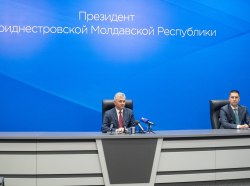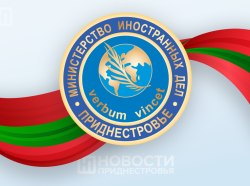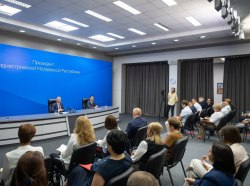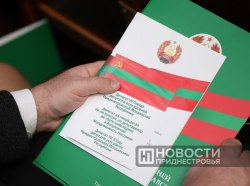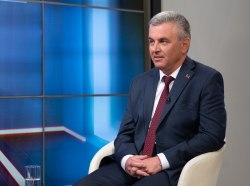Good evening! This is my pleasure to greet/ see you all at today’s meeting.
I would like to thank the Oxford Union and the Union President Michael Li personally for the initiative to have this meeting.
I am honoured to represent today the Pridnestrovian Moldavian Republic on such an authoritative platform and on behalf of the Pridnestrovian people to speak to you — promising representatives of the United Kingdom students, the future intellectual core of Britain.
We attach high importance to this kind of open communication, which is useful for all parties. The current situation is such that, unfortunately, Pridnestrovie is often seen through the prism of old stamps and myths, many of which were formed at the dawn of the 1990s and are irrelevant to reality.
***
In order to understand comprehensively and objectively the very essence and central idea of Pridnestrovie, as well as the current situation around the Republic, it is necessary to touch on the history of its statehood. I am often asked about the basis for our right to independence. I shall give a number of arguments in support of my position. The centuries-old history of our region is very rich and a whole set of historical facts deserve special attention.
The Moldovan statehood in the east never extended beyond the right bank of the Dniester River, i.e. it didn’t cover the historical territory of Pridnestrovie. As a result of the Bucharest peace of 1812 Bessarabia (the territory of contemporary Moldova) was ceded to Russia. In this context, I will specify a few significant dates: 225 years of entry of Tavria and Little Russia into the Russian Empire (1792) and 205 years of Bessarabia’s integration into the Russian Empire (1812).
As the most crucial agreements for our statehood I single out the San Stefano Peace Treaty and the Berlin Treaty. These peace treaties were concluded after the Russian-Turkish war of 1877−1878. It was then that states such as Romania, Serbia and Montenegro gained independence and Bulgaria became an autonomous principality. Bessarabia was finally recognized as an integral part of the Russian Empire.
It is important to emphasize that throughout this period the territories of contemporary Moldova and Pridnestrovie were parts of different administrative-territorial units of the Russian Empire: the Bessarabian province (1812−1917) was formed on the territory of contemporary Moldova, and Pridnestrovie belonged to the Kherson and Podolsk provinces.
After the First World War and the October Revolution of 1917 Pridnestrovie continued to exist separately from Bessarabia, and after the formation of the USSR, the territory of contemporary Pridnestrovie became part of the Ukrainian SSR in 1924.
During this period, another act of historical drama unfolds, connected with the occupation of Bessarabia. In December 1917, under the guise of purchasing food, Romanian troops entered Bessarabia: in fact, its gradual occupation began. The Romanian political elite thereby violated the terms of the San Stefano peace treaty and the Berlin Treaty. This is of fundamental historical significance.
March 27 is declared the state holiday by the Parliament of contemporary Romania. On this day, Sfatul Tarii (Council of Land) of the Moldovan Democratic Republic voted to unite Bessarabia and Romania in the autonomy at gunpoint. In November 1918, after the execution of the Presidium, Sfatul Tarii, in the absence of a quorum, voted for the unconditional union of Bessarabia and Romania. After that, Sfatul Tatrii was dissolved by the Kingdom of Romania. Uprisings began with many victims. The destruction of Moldavian ethnos, Moldavian history and culture started. For 22 years Bessarabia was part of Romania.
At the same time on historical territory of Pridnestrovie the Moldovan Autonomous Socialist Republic (MASSR) was formed by the decree of the Central Executive Committee of the Ukrainian SSR on October 12, 1924. It was part of the Ukrainian SSR on the basis of autonomy. Its capital was the city of Balta, and since 1929 — the city of Tiraspol.
Another milestone in the development of the historical statehood of Pridnestrovie is the Molotov-Ribbentrop Pact signed on August 23, 1939, which included the so-called «Secret Protocol', denoting assignment of spheres of influence to Germany and the Soviet Union in respect of some territories, including Bessarabia. This special protocol returned Bessarabia to Soviet Russia. To a certain degree it was a law-restorative document: Bessarabia was returned to Soviet Russia on the basis of the Berlin Treaty and the San Stefano peace treaty.
In August 1940 the Moldavian ASSR was abolished, since the territory of Bessarabia was ceded to it, which resulted in creation of the MSSR on the basis of these two historically different territories. It is important to catch this fundamental moment — Moldova itself (historical Bessarabia) gained its Soviet statehood by joining to the basis in the form of the MASSR (historical Pridnestrovie), i.e. we did not come to them, but they were brought to us.
Thus, only in the short 50-year period from August 1940 to September 1990, the territories of Pridnestrovie and Bessarabia were formally and legally united in the Soviet Union republic — the MSSR.
A year and a half before the collapse of the Soviet Union, the Moldovan authorities proclaimed a course toward secession from the Soviet Union and the creation of an independent state, which automatically deprived the population of Pridnestrovie of the Union citizenship and put it before the threat of possible inclusion in Romania.
On 23 June 1990, the Supreme Council of SSR Moldova adopted two documents, fundamentally significant to understand the mechanism of the split in the MSSR and formation of the PMR. The first of them, the Declaration of the Sovereignty of the Soviet Socialist Republic of Moldova of June 23, 1990, declared the actual withdrawal of Moldova from the USSR, including the rule of the laws of Moldova over union laws.
The second document is the Resolution which approved the decision of the special commission to recognize the Molotov-Ribbentrop Pact as null and void. By its adoption situation of 1940 was restored juristically, removing from Moldova its state-forming part such as the MASSR — so, in fact the entire territory of contemporary Pridnestrovie.
By this decision, the Moldovan parliament actually refused from Pridnestrovie. Using the principle of the right of nations to self-determination, contemporary Moldova withdrew not only from the USSR, but also from the MSSR. This happened a year before the collapse of the USSR.
What could Pridnestrovians do? On September 2, 1990, proceeding from the decision by the Moldovan Parliament, citizens of our land took a historic decision to establish the Pridnestrovian Moldavian SSR as part of the Soviet Union. So who are the «separatists' in reality?
On August 27, 1991, the Moldovan Parliament declared complete independence of the state. No problem, but within its borders of historical Bessarabia, certainly, without Pridnestrovie. After the USSR collapsed the Pridnestrovian Moldavian Republic was formed. We had all legitimate reasons to declare our statehood.
When they say that after the collapse of the USSR the world community recognized independence of the former union republics within their borders, the question arises. Well, in fact when the USSR was coming apart there was no longer MSSR on the basis of the decision by the Moldovan Parliament. They themselves recognized it as illegitimate, separating Bessarabia and contemporary Pridnestrovie. And if we recognize the states within the borders of the Soviet Union, then we must recognize both Pridnestrovie and Moldova as independent.
According to some legal experts, the disintegration process of the Moldavian Soviet Socialist Republic (MSSR) is a form when instead of one successor state two historically isolated units emerged, possessing necessary objective grounds for succession (the Pridnestrovian Moldavian Republic and the Republic of Moldova).
This is the basis of our statehood. I am convinced that if we collect all the facts, we can defend our independence in any international court if it is impartial.
That is why I say this within the walls of the leading British university. Progressive world community must know the real situation. It is fundamentally. In Moldova these facts are deliberately hushed up.
Why do Europeans, recognizing the Molotov-Ribbentrop pact null and void, still impose on us the legal consequences of this pact? Why is it evil for Poland, but someone decided for us that it is good for Pridnestrovie?
Going back to present day.
Moldova has made two strategic mistakes in its history. The first is the recognition of the Molotov-Ribbentrop pact null and void, the second is the military aggression of 1992. Moreover, Kishinev tried to correct its first mistake by military measures, trying to dictate its will to Pridnestrovians by arms. By winning the war we defended our independent future at the cost of lives of over 800 Pridnestrovie, including innocently lost children, women and the elderly.
Another mistake of Kishinev is the unilateral adoption of the Law «On the main provisions of the special legal status of the settlements on the left bank of the Dniester (Pridnestrovye)” of July 22, 2005. This stillborn legislative act was adopted outside the framework of the international negotiation process and without taking into account the real situation.
Having made strategic mistakes, Moldova is trying to find a way out of the situation, compensating/balancing for its mistakes by so-called «tactical perfidy'. What does it mean? It means various restrictions, blockades, limitation of personal rights and freedoms of Pridnestrovians, criminal prosecution for political reasons, non-fulfillment of previously reached agreements, ignoring the international 5+2 negotiating mechanism. Just imagine, over 25 years of political negotiations, about 200 documents were signed with the participation of international guarantors and mediators, including the OSCE, and all of them are intentionally not fulfilled by Kishinev.
What should we do in these circumstances conditions? The President of Moldova Igor Dodon is talking about the federalization of Moldova. Pridnestrovie proceeds from the results of the referendum on September 17, 2006, where our people voted for independence of the Pridnestrovian Moldavian Republic.
At the first meeting with the President of Moldova on January 4 this year, I suggested to move away from hot-button political issues and focus on socioeconomic and humanitarian issues, which affect the life of ordinary people. We agreed on that. We decided to bring for discussion general issues and find a solution on them. We have prepared a whole block of issues for our part, Moldova — their issues.
Pridnestrovie immediately switched from words to deeds, taking the first step and solving a number of problems in the interests of Moldovan citizens, including simplification of migration rules and providing freedom of movement. On the basis of Berlin Protocol signed on 3 June 2016 Pridnestrovie has closed criminal cases against 10 policemen of the RM. However, Kishinev has not yet made a reciprocal step.
During my personal meeting with the President of Moldova I emphasized: Pridnestrovie openly declares that the people have made a choice in favor of independent statehood and it is difficult to discuss some plans for the so-called «federalization'.
The important question is: is the Moldovan political elite ready to move seriously in this direction, to change the Constitution and the state structure of Moldova, establish a common parliament and other authorities and administrations, to repeal the 2005 law and other laws, to guarantee all civil freedoms, personal security and recognize the right of private property, grant official status to Russian and Ukrainian languages, etc.
It is obvious that Kishinev is not ready in principle. Then Moldovan politicians need to be honest and move from political insinuations to real solution of a whole range of problems that people’s lives depend on. These are criminal cases, participation of Pridnestrovian cars in international traffic, communications and telecommunications, railway communications, recognition of higher education diplomas, and much more.
At the same time, Moldova continues to make unilateral provocative decisions, leading to an aggravation of the regional situation. As an example — the recent decision of the Constitutional Court of the Republic of Moldova to recognize the presence of Russian peacekeeping forces on the Dniester as illegal, legally permitting the use of military means against them.
The next is the establishment of joint customs-border posts on the territory of Ukraine. This is a unilateral measure that is implemented outside the existing international negotiation process and without taking into account the position of Pridnestrovie, violating many previously signed agreements. The provisions on the inadmissibility of sanctions and blockades, on resolution of all issues exclusively at the negotiating table, and free international contacts of Pridnestrovie in the economic sphere are ignored.
Let me remind you that joint control is implemented with direct political and financial support of the European Union, which is also an observer in the negotiation process.
Speaking about the true reasons for joint control, it is appropriate to quote a representative of one of the guarantor countries in the negotiation process. On May 25, Ukraine’s ambassador to Moldova Ivan Gnatyshyn said: «Kiev seeks to establish a blockade of Pidnestrovie, for the trade relations of the separatist region to be regulated by Kishinev”.
Indeed, the new regime jeopardizes supply of the republic, undermines the sphere of individual entrepreneurship, threatens with the detainment of goods and arrests of those hundreds of Pridnestrovians who have criminal cases in Moldova. According to preliminary calculations, the losses for the republic’s economy will amount to more than $ 40 million dollars. Moreover, presence of Moldovan security forces in the immediate vicinity of the Pridnestrovian military threatens regional stability.
Unilateral pressure on Pridnestrovie is implemented on a no-objection basis from the side of certain participants of the negotiation process, first of all, the current Austrian Chairmanship in the OSCE, which have been refusing to convene a 5+2 meeting for half a year already.
Back on March 30 this year I approached Igor Dodon with a proposal to jointly forward the appeal to the OSCE Chairman-in-Office Sebastian Kurz about the immediate convening of the 5+2 format, since operation of this format is actually frozen. This is the format where Pridnestrovie officially acts as an equal party to the negotiation process. It is June on the calendar, still there is no answer.
The unprecedented decision of Kishinev to ban five Russian diplomats from the country, three of which were members of the Joint Control Commission, a tripartite body that manages the peacekeeping operation, gained great public outcry.
Today, the Moldovan expert community, by the private order of state structures, publishes another provocative plans «of coercion of Pridnestrovie to the so-called reintegration”, offering a wide range of violent methods that have nothing to do with civilized approaches and respect for human rights.
German philosopher George Hegel said, that history repeats itself twice: first in the form of tragedy, the second in the form of farce. An attempt to solve our problem in the first case by the 1992 war is a tragedy, and all other attempts of unilateral actions without taking into account the opinion of the people Pridnestrovie is a farce.
I am deeply convinced that we can ensure our security only by preserving the statehood of Pridnestrovie. The main thing is the preservation of peace and people’s lives. European politicians tell me: you are unrecognized. I explain to them the following: recognition is not an end in itself, the most important thing is peace on this land. What is the value of the fact that recognized states get involved in military adventures, there is a civil war on their territory, they cannot maintain peace and save people’s lives? And we have not lost a single person in the fighting for the last 25 years. This is the main value that must be saved.
We understand where the negative conjectures about Pridnestrovie come from, which have been in the western media sphere for a long time. I invite you to visit the Pridnestrovian Moldavian Republic, to talk to our citizens and to form your own opinion on the state of affairs in our country. I believe that you will be able to see for yourself that Pridnestrovie is a peace-loving multi-ethnic society in which there are no conflicts on national grounds and the traditions and views of representatives of any ethnos, of any confession and diaspora are respected.
We would be glad to build partnership relations between Oxford and Pridnestrovian State University named after Ukrainian poet Taras Shevchenko. Our university was found in 1930 and it was the first higher education establishment in Soviet Moldavia. Today PSU is a classical university with research capacity which has a Centre of English Language and American Culture (opened in March 2013), 7 specialized international culture-linguistic centers, including French, Bulgarian, Russian, Ukrainian, Moldavian, etc.
We understand where the negative conjectures about Pridnestrovie come from, which have been in the western media sphere for a long time. I invite you to visit the Pridnestrovian Moldavian Republic, to talk to our citizens and to form your own opinion on the state of affairs in our country. I believe that you will be able to see for yourself that Pridnestrovie is a peace-loving multi-ethnic society in which there are no conflicts on national grounds and the traditions and views of representatives of any ethnos, of any confession are respected.
Certainly, we will achieve independence, but it must be achieved peacefully, in order to save the lives of people. I am a supporter of the negotiation process in any formats. All issues need to be addressed exclusively at the negotiating table.
In conclusion, I would like to recall Winston Churchill’s historic saying after the signing of the Munich agreement on September 30, 1938 — «England was given the choice between war and dishonor. You chose dishonor and you will have war”.
Today the situation around Pridnestrovie is very similar. Certain external forces by the hands of Moldova and Ukraine deliberately create conditions for destabilization and the gradual unfreezing of the conflict. Such actions fabricate not only for Pridnestrovie, but also for all responsible world players an absolutely artificial choice between the war (i.e. a new round of armed confrontation) or dishonor in the form of political concessions against the will of the Pridnestrovian people.
As history shows, in the end, all without exception come off a loser — both organizers and involved participants of such geopolitical combinations. But the saddest thing is that ordinary people and the very matter of preserving peace and stability are suffering.
I am convinced that it is not too late today to reverse this negative trend and, through common efforts, to prevent the slide into the abyss.
I say quite clearly — between these two extremes Pridnestrovie chooses the third way — a civilized, open and fair political dialogue based on universal international principles, inalienable rights and freedoms of particular person as well as nations and nations as a whole.
We want to be heard and we need the support from the whole sober-minded part of the world community, including the United Kingdom.
Thank you for your attention, I am ready to answer your questions!

